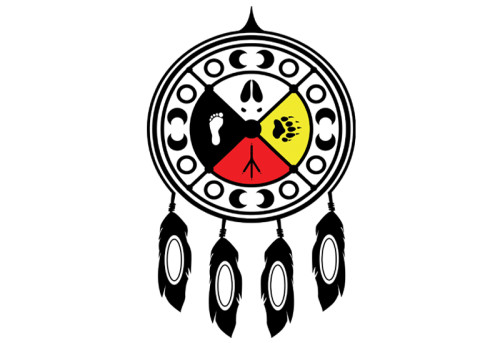WIKWEMIKONG—During a recent meeting with staff of the Wikwemikong Unceded Indian Reserve land claims department, The Expositor learned that Manitoulin’s largest First Nations community was not informed of a recent visit to members of the United Chiefs and Councils of Mnidoo Mnising (UCCMM) by the Department of Fisheries and Oceans (DFO). (Wikwemikong has not been a member of the UCCMM for many years.)
Land claims officials at Wikwemikong say this oversight is relevant and important because of the band’s specific land claim to off-shore islands around its shores and that Wikwemikong representatives should have been included in any meetings involving the relinquishing of Crown property.
The DFO made the trip to Manitoulin in October to discuss the divesture of lighthouses deemed “surplus” by the federal government and to outline the proposal made by the Manitoulin Lighthouse Committee (MLC) to take over the lighthouses with the UCCMM and hear any concerns the First Nations may have had.
Bill Caesar, co-chair of the MLC, told The Expositor he thought the DFO had met with all of Manitoulin’s First Nations and said he was surprised to learn Wikwemikong had not been notified of the fall visit.
He further noted that the Lonely Island lighthouse, one of the area lighthouses deemed surplus, was originally part of the MLC proposal, but that due to Lonely Island being part of Wikwemikong’s specific land claim, the group has since backed off.
“We realize that (Lonely Island) is a legitimate land claim by the people of Wikwemikong,” Mr. Caesar said, noting “we have extended a welcome for Wikwemikong to join the association.”
Duke Peltier, claims negotiator with Wikwemikong, pointed to the 1997 case that saw the First Nation seek legal action against the provincial and federal governments for failing to recognize the band’s legal interests in relation to unsold islands from Sault Ste. Marie to Parry Sound.
“We are seeking legal recognition of what we know is rightfully ours,” said former Chief Margaret Pitawanakwat in a 1997 press release. “We are not infringing on the rights of existing owners. The legal action will involve an accounting with the federal government and a legal recognition of Wikwemikong’s interest in what are presently described as Ontario Crown islands in this area.”
Mr. Peltier said that especially considering this case (which is still before the courts), he and the rest of the claims department were surprised to learn they were left out of talks, noting that the government has an obligation to inform all parties involved in land claims if there is an undertaking that might touch on the First Nation’s ongoing land claim process.
“The unresolved island issue raises serious questions of conflict of interest on the part of the federal and provincial government,” the 1997 release from Chief Pitawanakwat continues. “By the Bond Head Treaty of 1836, the Crown recognized the exclusive interest of the Ottawas and Chippewas (Ojibwas) by agreeing to withdraw its claim to these islands and to recognize the aboriginal title of the Ottawas and Chippewas. In return, the Ottawas and Chippewas agreed to allow other Indians to also use and occupy such islands.”
The chief also noted that in 1862, the Crown attempted to “secure a surrender of Manitoulin Island,” but no other islands were included in the negotiations. And, on October 6, 1862, the chiefs of the bands located west of Heywood Sound (Manitowaning Bay) and the Manitoulin Gulf (South Bay) signed the treaty, now known as the Manitoulin Treaty, while the chiefs of the bands located east of this area, Wikwemikong, did not sign or assent to the treaty.
The community notes that the Crown began surveying and selling islands in the claim area after 1862, an act that was protested by Wikwemikong soon after.
“In 1914, following a 32-year dispute during which the Wikwemikong Indian Band and the Manitulin Island and North Shore bands were excluded, Canada and Ontario agreed between them that the islands surrounding Manitoulin Island and along the north shore of Lake Huron were Ontario Crown lands,” the release continues.
In 1984, a claim with the Department of Indian Affairs was filed under the Specific Claims Policy, and in 1997, the federal government denied that the band had any right, title or interest in the off-shore islands, thus causing the First Nation to bring both governments to court.
“The band is seeking legal recognition of its continuing interest in the unsold and unpatented islands, as protected under the Bond Head Treaty of 1836,” the release concludes.
According to the Aboriginal Affairs and Northern Development Canada fact sheet on the negotiation process of Wikwemikong’s specific claim (the islands from Heywood Sound, including Heywood Island, and around the eastern shore of Manitoulin), “Canada, Ontario and Wikwemikong agreed to a process to negotiate the land claim in November 2007. While discussions at the table are proceeding well, much work remains to be done before a final settlement can be concluded.”
“Local interests and concerns will be taken into account during the negotiation process,” the fact sheet continues. “Wikwemikong will consult its members and share information about the negotiations with the community. All parties have agreed to communicate and share information with groups and individuals having an interest in the outcome of negotiations such as the local municipality, property owners and people using the area for recreational purposes.”
The Expositor called the DFO for comment as to why Wikwemikong was left out of the fall visit, but failed to hear from the department as of press time Monday.




